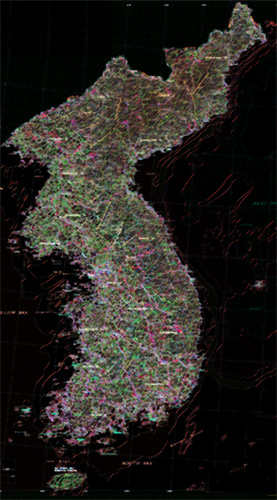 Koreans understand the importance of blogging. In 2007, Korea was ranked 2nd internationally for percentage of citizens who regularly read blogs[1] with 63% of so-called “influencers” reading blogs regularly. Every Korean is familiar with the idea of the “power blogger,” the blogger who racks up massive hits and influences masses of people.
Koreans understand the importance of blogging. In 2007, Korea was ranked 2nd internationally for percentage of citizens who regularly read blogs[1] with 63% of so-called “influencers” reading blogs regularly. Every Korean is familiar with the idea of the “power blogger,” the blogger who racks up massive hits and influences masses of people.
Korea knows blogging.
Now a new trend is rising, and that is the trend of the foreign-resident blogger in Korea. This is a trend that could have significant impact on Korea.
Why?
Because information about Korea does not always reach the west through traditional media, but is increasingly being transmitted by the Internet and specifically by blogs. In traditional media, you need “experts” to develop over time, journalists to write over time, magazines to pick themes over time. But now, a country that is under-represented in traditional media does not need to wait for traditional media to wake up and smell the coffee. The foreign-resident blogosphere is large and growing. This is outstanding news, because blogs can surpass traditional barriers to publication and spread of information.
There are 300 self-identified “foreign” blogs about Korea listed at http://www.koreanbloglist.com. These are mainly by foreign residents of Korea, who report Korea to the larger world. Because bloggers have to be aware of the koreanbloglist and sign up to be listed on it, the real number of foreign-resident blogs is much larger than 300. What is the impact of this? More important what will the impact be?
The current impact is fairly staggering. No complete account exists, but just by adding up the page hits of two K-pop blogs (PopSeoul and DramaBeans) and a handful of the most popular blogs across subject area (in total, 12 blogs), one sees that nearly 400,000 pages about Korea, written by foreign-residents, are seen every day. Add in a blog like Allkpop, which gets millions of hits a day, and it becomes clear that the Internet is a massive information portal for South Korea.
 With the good, comes the bad, of course, and there has been an increase in the number of “complaint” blogs. Unfortunate in one way, perhaps a canary in the coal-mine, these blogs can be rendered inconsequential if Korea harnesses the positive power of blogs by foreigners in Korea.
With the good, comes the bad, of course, and there has been an increase in the number of “complaint” blogs. Unfortunate in one way, perhaps a canary in the coal-mine, these blogs can be rendered inconsequential if Korea harnesses the positive power of blogs by foreigners in Korea.
The fact is that the vast majority of current foreigner-in-Korea blogs are generally positive and are eager to get out good news about Korea. Blogs like Roboseyo (http://roboseyo.blogspot.com) discuss day-to-day events and how to understand cultural or language differences; ZenKimchi (http://www.zenkimchi.com/FoodJournal/) introduces English-speaking readers to Korean food; My own blog, KTLIT (https://www.ktlit.com), discusses translated Korean modern literature. Hundreds of other bloggers cover hundreds of other aspects of Korea, from large to small, and millions of viewers see these pages. Now, it is up to bloggers in Korea, and Korea itself to make this a potentially powerful force for a second Korean wave.
The good news is that this is already happening. The Presidential Council on National Branding, led by Chairman Yoon-Dae Euh, is acutely aware of the foreign-resident blogosphere and is making commendable outreaches to that community. Entrepreneurs such as Tatter&Media, Nanoomi, and Looah are working hard to create diverse distribution channels for foreigner-in-Korea blogs and are creating a community of translators who will further expand the flow of Korean information to the international community. Korean website Korea Net (http://korea.net/index.do) features bloggers on its home pages and at http://koreannewsfeeds.com/ interested browsers can find a portal site aimed at Korean blogs in English.
These kinds of sites and partnerships, unimaginable as recently as 5 years ago (for both technical and social reasons), represent an important opportunity for Korea to spread its news. Blogs, with their instantaneous transmission, are ideal for a country as vibrant and fast-paced as Korea. The Internet is just as “palli-palli” as Korea and it can reflect changes as they take place in real time.
There is no telling exactly where the expanding foreigner-in-Korea blogosphere will take us. But just as blogs have become an essential part of life in Korea, blogs written by foreigners in Korea will also become an essential part of how Korea is represented in the world. Perhaps most foreign-resident blogs will one day be aggregated; perhaps the ‘traditional’ press will come to use them for content and analysis; perhaps elements of Korea or its government will partner with and support some of these blogs; most likely something completely unexpected will happen. But now is the time to work together to ensure that the results are positive. The channels of information are opening quickly, and it is up to all of us to take advantage of them. Blogs in English are among the tools that will define Korea internationally in the years ahead.
[1] Edelman, A Corporate Guide to the Global Blogosphere, p 5


